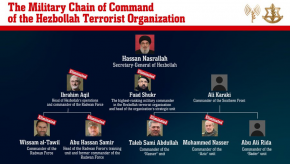The beeper attack, of course, isn't even the biggest event in the last couple weeks.
On the 24th of August, as Hezbollah prepared to launch a massive rocket attack on Israel's center, the IAF pre-empted it and struck some 6,000 launch barrels.
Since then it has launched at least 2 more attack waves, each eliminating over 1,000 barrels, including one just now where they reportedly destroyed "thousands".
(Yes, I know, OSINTDefender is a horrible source, but video appears to be legit).
Notice the shockwave. In military terms, this is a big kablooey. Indicates weapons storage facility.
Following the beeper attack, Hezbollah's Radwan Force leadership, including 20 figures, gathered in what they believed to have been a secret location in the Dahiyeh suburb, a Hezbollah stronghold in Beirut.
4 bombs dropped on a building above their underground hideout, collapsing it onto them. Nothing published as far as civilian casualties, but at least 15 of them are confirmed KIA.


To understand why Hezbollah is taking such massive hits, we must first understand how Hezbollah is built.
Hezbollah's Raison d'etre is to deter Israel from committing to a strike campaign in Iran, primarily for Iran's nuclear program. As such it needs to have the capability to inflict serious harm to Israel. What harms Israel the most? The operation of its economy.
By raining thousands of rockets on Israel, and hitting every Israel city, every industrial zone - Hezbollah can paralyze Israel's economy, costing it billions of dollars every day without even including any expenses for prosecuting a war.
Once Hezbollah achieved that, they needed to build other ways to amplify this damage. This includes operational plans to hit Israel's MIC and military installations, and destroy highly expensive Israeli military hardware, as well as hitting industrial zones that will shut down some parts of Israel's economy until they rebuild long after a war ends.
Hezbollah's strategy rests on the following pillars:
- Have as many projectiles as possible - from very short range to very long range.
- Turn as many of these into PGMs as possible.
- Invade Israel (Radwan Force) to delay a ground invasion and thus prolong the logevity of the missile arsenal.
Right now, we have evidence Israel is striking at launch tubes in huge numbers, as well as stockpiles. That's pillar #1 massively damaged.
Radwan's leadership has been decimated, and its mid-level officers and valuable field operatives have been hunted down for the last 11 months. That's pillar #3 practically destroyed.
Pillar #2 depends a lot on pillar #1, and itself manifests in the form of factories where they receive guidance kits from Iran and install on "dumb" projectiles. I have not seen evidence yet of their targeting, but I assume it was done to some extent.
Hezbollah has lost its capability to properly wage war on Iran's behalf. Whatever Hezbollah chooses now, it cannot come out victorious. It must decide whether to disengage, cut the losses, and hope Israel backs down, or go all in and very likely face extinction. Either way, it's very difficult to make such decisions when most of the professional leadership including the advisors are gone.








